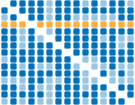Ruby Brown (English)
She was young and beautiful
And golden like the sunshine
That warmed her body.
And because she was colored
Mayville had no place to offer her,
Nor fuel for the clean flame of joy
That tried to burn within her soul.
One day,
Sitting on old Mrs. Latham's back porch
Polishing the silver,
She asked herself two questions
And they ran something like this:
What can a colored girl do
On the money from a white woman's kitchen?
And ain't there any joy in this town?
Now the streets down by the river
Know more about this pretty Ruby Brown,
And the sinister shuttered houses of the bottoms
Hold a yellow girl
Seeking an answer to her questions.
The good church folk do not mention
Her name any more.
But the white men,
Habitués of the high shuttered houses,
Pay more money to her now
Than they ever did before,
When she worked in their kitchens. | Uploaded by | P. T. |
| Source of the quotation | http://www.poetrynook.com |
|
Ruby Brown (Hungarian)
Szép volt és fiatal,
aranyló, mint a nap,
mely testét sütötte.
De színesnek született,
s igy Mayville-ben nem volt
számára hely, sem táplálék
lelke tiszta lángjainak.
Egyszer
Lathamné konyháján ült,
ezüstöt tisztogatott
s két kérdést tett föl magának.
Ezeket: Mi haszna van
egy színes lánynak egy fehér
asszony konyhapénzéből?
És: Semmi öröm nincs hát ebben a városban?
Az utcák lenn a folyó partján
többet tudnak a csinos Ruby Brown-ról.
Azokban a sötét házakban
egy sárga lány él,
aki választ keresett kérdéseire.
Templomjáró tisztességes emberek
nem ejtik ki nevét.
De a fehér férfiak,
a sötét házak törzsvendégei
többet fizetnek néki,
mint amit minden konyhamunkájával
megkereshetett volna valaha. | Uploaded by | P. T. |
| Source of the quotation | K. A. |
|
